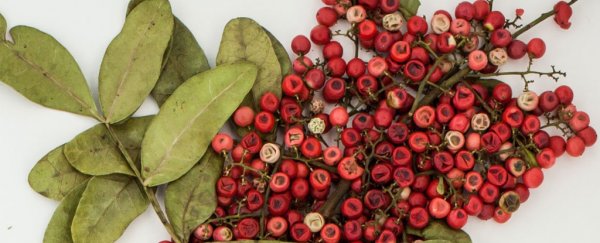A berry extract used by indigenous healers in South America for centuries could offer a new way of fighting antibiotic resistance.
Researchers say the red berries of the Brazilian peppertree (Schinus terebinthifolius) contain a compound that can disarm the virulence of MRSA – a dangerous bacterium that has developed resistance to many of our commonly used antibiotics.
MRSA – aka Methicillin-resistant Staphylococcus aureus – most commonly causes lesions on the skin, but serious infections can be life-threatening, with estimates that the superbug contributes to as many as 11,000 deaths in the US each year.
But researchers at Emory University say an extract from the Brazilian peppertree's berries can prevent mice infected with MSRA from developing these lesions, by repressing a gene that the bacteria use for communication.
It's a new level of insight into the workings of a very ancient skin remedy.
"Traditional healers in the Amazon have used the Brazilian peppertree for hundreds of years to treat infections of the skin and soft tissues," says ethnobotanist Cassandra Quave, who investigates indigenous culture healing practices to find new drug candidates.
"We pulled apart the chemical ingredients of the berries and systematically tested them against disease-causing bacteria to uncover a medicinal mechanism of this plant."
The extract – called 430D-F5 – is a mixture of 27 chemicals, and when it was given to mice infected with MSRA, the treated animals did not develop skin lesions, while the untreated group did.
According to the team, the compound doesn't kill the bacteria, but silences a gene that enables the bugs to collectively communicate with one another. That bacterial signalling system is known as quorum sensing, and shutting it down is called quorum quenching.
"It essentially disarms the MRSA [bacterium], preventing it from excreting the toxins it uses as weapons to damage tissues," Quave says.
"The body's normal immune system then stands a better chance of healing a wound."
While it silenced MSRA's communication channels, the extract did not appear to harm mice or their skin tissues, and did not affect healthy bacteria on the animals' skin – it just prevented the bugs from collectively releasing toxins that cause boils and sores.
"It's stopping communication among the bacteria," Quave explained to Maggie Fox at NBC News.
"It kind of tricks them into believing they are alone. When they are alone, they behave differently than when they are in a group."
While the MSRA-silencing effects of 430D-F5 have only been demonstrated in mice so far, the researchers are hopeful that further study may highlight new avenues for treating bacterial infections in humans – especially since the Brazilian peppertree has its traditional legacy of being used in poultices for infected wounds and ulcers.
The same team previously discovered the quorum quenching process at work in another historical remedy – leaf extracts from the European chestnut tree, long used as a folk medicine before modern times, and which now could prove another means of disarming MRSA.
These compounds may provide a delicate way of taking on harmful bacteria, rather than the more aggressive 'head-on' approach of antibiotics – which can lead some bacteria to evolve into dangerous mutated strains that are resistant to the common antibiotics we use.
"In some cases, you need to go in heavily with antibiotics to treat a patient," Quave explains in a press release.
"But instead of always setting a bomb off to kill an infection, there are situations where using an anti-virulence method may be just as effective, while also helping to restore balance to the health of a patient."
It's important to note that because the compound didn't actually kill off the bacteria, it's not a cure for MRSA, as the treated mice were still infected.
But the researchers say a single dose of the extract had positive effects for up to two weeks, and will be looking into studying treatments with the compound alongside simultaneous antibiotic therapy in future research.
The team is now looking into how the berry extract from the Brazilian peppertree might safely and effectively be used in humans, with a view to hopefully conducting clinical trials in the future.
In the meantime, the researchers say it's unwise to consider picking the berries for any homespun skin remedies – as years of testing are still needed to make sure they're totally safe, despite their traditional usage.
"I don't want people to go out and try putting random berries on their skin," Quave told NBC News.
"Natural is not always safe. There are lots of things in the natural world that can harm you if you use them improperly ."
The findings are reported in Scientific Reports.
